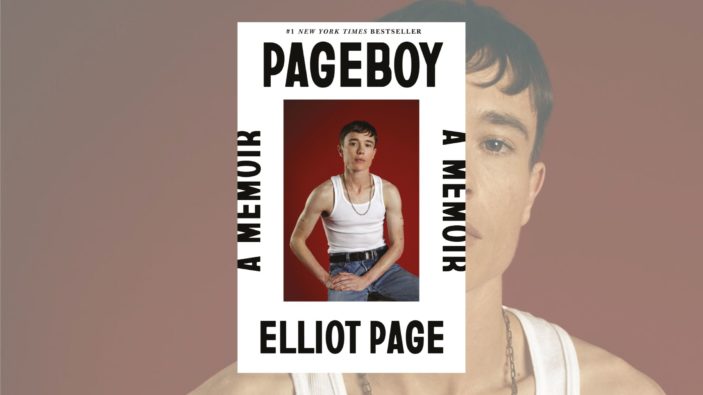
Pageboy is the recent memoir from Elliot Page, an actor known for his starring roles in Juno, Whip It!, and most recently The Umbrella Academy series.
Pageboy is different from many other celebrity memoirs in that the subject wrote it entirely himself, and not through using a ghost writer. This has the effect of the book feeling very present and fresh, like having a long conversation with someone who is choosing to share the most intimate parts of themself. The syntax and cadence of the words, the often meandering stories to illustrate a lesson learnt, feel like those deep conversations had in the middle of the night around a campfire or a kitchen table.
This winding narrative style means that the book moves about in time, detailing Page’s career in a non-linear fashion, jumping between childhood, adulthood, adolescence, work, school, holidays, and romances. The focus of the chapters and the narrative arc is more aligned with the changes in his relationships with family, friends, lovers, and, most importantly, himself. It’s a complicated and often very painful journey, and it feels as though the often meandering timeline reflects that.
One of the most difficult to read chapters retells several incidents from when he was quite young and new to working in Hollywood. During this time, he was sexually assaulted by more than one person disguising themselves as a friend, taking advantage whilst in a position of power over him. He takes care to say that not all of Hollywood was like that, that he has also made lifelong friends in the industry. But at different times, when he told people he thought he may be gay, he was told to keep it to himself because he could never work as an openly gay actor.
Hollywood is built on leveraging queerness. Tucking it away when needed, pulling it out when beneficial, while patting themselves on the back. Hollywood doesn’t lead the way, it responds, it follows, slowly and far behind. The depth of that closet, the trove of secrets buried, indifferent to the consequences. I was punished for being queer while I watched others be protected and celebrated, who gleefully abused people in the wide open.
page 106
Regarding the ways that internalised homophobia and transphobia infiltrate minds from a very young age, he reflects on one of his first crushes at school, and how they could never speak of or validate the way they felt for each other:
I resent that we were cheated out of our love, that beautiful surge in the heart stolen from us. I am furious at the seeds planted without our consent, the voices and the actions that made our roads to the truth unnecessarily brutal.
page 179
One of the endearing aspects of this memoir is the maturity of it all. Even when the very justified anger and frustration at certain experiences comes through on the page, none of his portrayals of the individuals who hurt him are vindictive or feel unfair. When writing about the horrific emotional abuse he grew up with living part-time with his father and stepmother, he is attempting to understand why it was happening, as much as trying to unravel the feelings of shame and self-hatred that it left him with. While writing about these experiences he is very honest, not just about how it all happened, but also about his own mistakes, his shortcomings, and his slow and painful journey towards the truth of himself and learning to embrace it.
He also acknowledges the privilege he has, as a public figure with access to resources and healthcare that many trans people are routinely denied. And while acknowledging this privilege, he also expresses frustration that these things should not be a privilege at all; gender-affirming care saved his life, and no one should be denied that or forced into gratitude for having received it.
What particularly shines through, though, is his gratitude and love for chosen family – the individuals who knew from a young age that he was queer, even before he had the words to acknowledge it himself. There are many stories here of people who offered love, safety and support in the form of places to stay, social events when he was self-isolating, physical care when he was struggling, and long conversations trying to get to the bottom of his discomfort in his own body.
This book is brilliant, deep, and achingly real. It is offered with generosity and good faith into a world that utterly needs these kinds of stories. Elevating these kinds of lived experiences helps to break down the barriers that exist for queer and trans people in an increasingly hostile world, and creates understanding and compassion for vulnerable people who deeply need to be seen. Whether they know of Page as an actor or not, everyone should read his story.
![]()
![]()
![]()
![]()
![]()
FOUR STARS (OUT OF FIVE)
Pageboy by Elliot Page is available now from Penguin Books. Grab your copy from Booktopia HERE.
